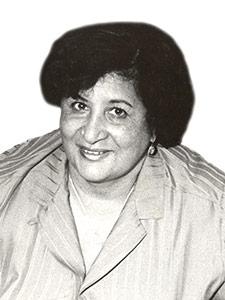Discover Your Roots
SIGN UPDiscover Your Roots
SIGN UPEvelina is a Slavic-origin female name, derived from the Old Germanic name Avelina, meaning "Form of Evelyn." The name gained popularity during the Norman Conquest in Britain and evolved into various forms such as Aveling, Eveling, and Aveline, eventually leading to the emergence of the name Evelyn. In the 18th century, the preference for Latinized women's names saw the rise of Evelina, inspired by the titular character in Fanny Burney's novel "Evelina." Notable individuals bearing the name include Finnish singer Eveliina Tammenlaakso, British suffragette Evelina Haverfield, and Greek fashion model Evelina Papantoniou. The name also holds fictional significance as the title character of the 1778 novel "Evelina" and a main character in the 1788 opera "Arvire et Évélina." With its rich historical background and diverse cultural associations, Evelina remains a timeless and meaningful choice for a female name.

Evelina Lopez Antonetty (1922−1984) was a prominent Puerto Rican civil rights and education activist known for her dedication to improving the lives of Puerto Rican children in New York City. Growing up in poverty in Puerto Rico and later in the Latino community in Harlem, Antonetty's personal experiences fueled her passion for advocating for marginalized communities. After working for political leaders and labor unions, she founded the United Bronx Parents in 1965, an organization that empowered parents to actively engage in their children’s education and successfully advocated for bilingual education in schools. Antonetty's tireless efforts led to significant changes in the education system, and her legacy continues to inspire community involvement and activism. In recognition of her impactful work, a mural was dedicated to her in the South Bronx in 2011. Evelina Lopez Antonetty's remarkable leadership and advocacy have left a lasting impact on education and civil rights, and her contributions continue to be celebrated today.

Evelina "Nina" Mount (1837–1920) was a 19th-century American female artist known for her floral still-lifes and landscapes. Born in Stony Brook, New York, she was introduced to art at an early age by her father and artistic uncles, particularly William Sidney Mount, who mentored her for the first three decades of her life. Despite the social constraints for young women during the mid-19th century, Evelina surpassed them, becoming a successful artist due to her familial connections. She received informal training and guidance from William, who also encouraged her to pursue formal artistic training in New York City and later study with Hudson River School artist James McDougal Hart. Evelina exhibited her works at the National Academy of Design and the Academy of Design in Chicago but rarely sold her paintings, choosing instead to gift them to family and friends. Her style evolved over the years, with a shift in her floral still-life representations after her training with Hart. In addition to her floral still-lifes, Evelina's landscape paintings, often featuring her hometown of Stony Brook, showcased her love for the area and her artistic skills.

Evelina Louise Samuelsson, born on March 14, 1984, in Stockholm, Sweden, is a renowned ice hockey player. Notably, she achieved a bronze medal at the 2002 Winter Olympics, showcasing her exceptional skills and dedication to the sport. With a successful career, Samuelsson has become a respected figure in the world of ice hockey. Her contributions have left a lasting impact, inspiring many aspiring athletes. For more in-depth information and career statistics, you can refer to Eliteprospects.com or Eurohockey.com. Samuelsson's remarkable journey and achievements continue to inspire and influence the ice hockey community, solidifying her status as a true sports icon.

Evelina Zuni Lucero, born October 10, 1953, is a celebrated Native American novelist, poet, and journalist of Isleta Pueblo/Ohkay Owingeh descent. Her literary achievements include winning the prestigious First Book Award from the Native Writers' Circle of the Americas for her novel "Night Sky, Morning Star." Lucero's upbringing in Isleta Pueblo and her encounters with influential figures like Pueblo poet Simon Ortiz significantly shaped her writing and perspectives. She currently resides at Isleta Pueblo and serves as the Chair of Creative Writing at the Institute of American Indian Arts in Santa Fe, New Mexico. Lucero's notable works, including "Night Sky, Morning Star" and her co-edited book "Simon J. Ortiz: A Poetic Legacy of Indigenous Continuance," have earned her recognition and accolades. Her literary contributions offer a profound insight into contemporary Tiwa-speaking Pueblo life and explore themes of love, tradition, and the Native American experience. Lucero's dedication to her cultural heritage and her impactful storytelling continue to resonate with readers and scholars alike.

All images displayed on this page are sourced from Wikipedia or Wikimedia Commons.We use these images under their respective Creative Commons or public domain licenses. Wherever applicable, author attributions and license information are provided. If you believe an image is used incorrectly or outside its license terms, please contact us so that we can review and correct the issue.